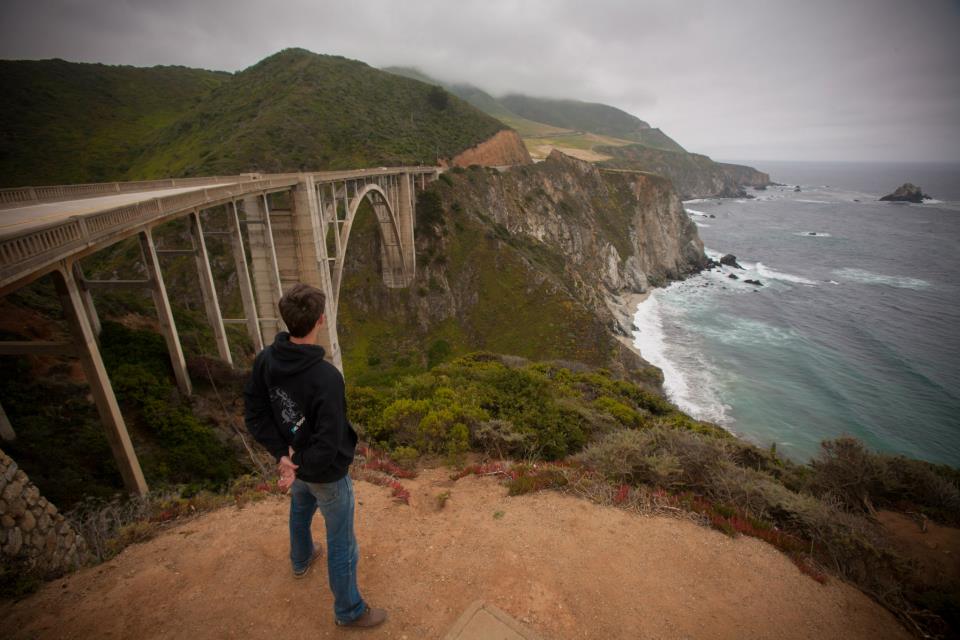By Doyle Irvin, American Forests
The truth is that I like murky weather. I cannot explain what it is about me that feels at home in the fog, rain and snow, but it is undeniable. I feel in my element when I can simply zip up my jacket and follow my feet, seeing where they take me, and hopefully get lost. My favorite hikes take me in and about the fog line, allowing me to glimpse the underworld, purgatory and what feels like heaven.
Growing up in Oakland and Berkeley, Calif., this kind of atmosphere was familiar — frequent even. The days had a routine: every morning would be fogged over — sweatshirt weather — and by the afternoon it would have burnt off. You knew that if you drove up to the Grizzly Peak cliffs at night you would be submerged in a 5 m.p.h. soup, the fog so obscuring your vision that anything faster would be absurdly dangerous. Even though I traversed these areas hundreds of times, they always retained a sense of discovery. What was just behind this shroud? What adventures lay behind the next bend in the road? What kind of new trees and vines had grown since my last visit?
I left California for college six years ago, and the California that I left is not the California that exists today. Before college, I had what I would now call an “eco-subconscious.” I knew that the environment was important, and that it required protecting, but I hadn’t experienced a first-hand “moment” that really drove home the reality of the rest of the world. Conservation was some big thing I agreed with but would let other people handle.
There were two moments that woke me up. One was a gradual realization, drawn out over the course of a season, and the other moment was a stark second. The former happened when I returned home after college to work in the Bay Area for a few years. As summer wound down, I greatly looked forward to what the Bay gently calls “winter,” which is not really a winter at all, but instead a more intense submersion into its normal fog. This simply didn’t happen. The weather had noticeably changed because of the severe drought that had begun afflicting California while I was away at school. Gone was the rain, and with it, much of the fog. Gone was the sweatshirt weather. The days were hotter, and it felt like San Francisco was slowly but surely turning into Los Angeles. The whole winter felt like a held-in breath, anxiously waiting for something to happen that never came.
The second moment, that stark second, is intrinsically informed by the first, because everything is interconnected. My brothers and I love to snowboard. I especially like floating through the trees, gliding on un-combed terrain, powder snow keeping me afloat. Sometimes I take my time in the forest, turning a run into 45 minutes, sitting and enjoying the utter quiet that being a little off the beaten path affords you. The silence is extraordinary. That first winter back from college, I drove up to Lake Tahoe with my older brother, excited for a few long days on the mountain. We parked at the resort and saw familiar snow on the runs. And then, I turned around. Bare rock, as far as the eye could see. The mountains were naked. The only snow for miles was man made and manicured. My brother and I kept doing 180s, turning and turning, unable to believe how bare California had become.
My experience with the drought in California really brought home to me how real and already present climate change is. It brought conservation out of the abstract subconscious, out of the place in my mind that felt comfortable saying “someone else will do it.” I heard about American Forests through the father of one of my friends, who had planted trees as a volunteer. It’s clear just how important our forests are with regards to our water, our atmosphere and our future. When I saw that there was an opportunity to contribute to the work done by American Forests, I decided that I would no longer leave it for someone else to do. The tragic part of this story is that it took my own life being interrupted for me to see the necessity of taking action. Hopefully my work in communications here at American Forests can help reach people in ways where they would not require a first-hand experience in order to understand the urgency of our shared situation.
